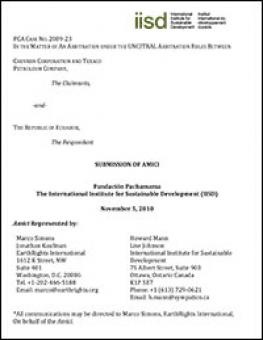
Amicus Curiae Fundación Pachamama and The International Institute for Sustainable Development (IISD)—Chevron v. Ecuador
This amicus curiae brief focuses on the investor-State arbitration under the UNCITRAL arbitration rules with Chevron Corporation as the Claimant, and the Republic of Ecuador as the Respondent.
This amicus curiae brief focuses on the investor-State arbitration under the UNCITRAL arbitration rules with Chevron Corporation as the Claimant, and the Republic of Ecuador as the Respondent.
The brief examines the extraordinary nature of this arbitration and analyzes the orders sought by the Claimant, Chevron, and their implications. It includes a summary of the arguments presented by amicus and describes the background to this arbitration. The brief comes to the conclusion that the Tribunal should dismiss the present arbitration on the basis of a lack of jurisdiction (the tribunal has no jurisdiction under the U.S.-Ecuador Bilateral Investment Treaty), and of a lack of justiciability of the orders sought by the Claimant.
You might also be interested in
Chevron v Ecuador: Petition for Participation as Non-disputing Parties
Why the Energy Charter Treaty Modernization Doesn't Deliver for Climate
The Energy Charter Conference adopted the "modernized" Energy Charter Treaty (ECT) on December 3, 2024. IISD's Lukas Schaugg explains what the modernization does, when it will enter into force, its tension with EU law, and why the reformed ECT can still hinder climate policies.
The Responsible Agricultural Investment Tool for Agribusiness and Case Studies
This report summarizes a collaboration to support agribusinesses in complying with principles of responsible investment in agriculture and food systems.
Stabilization Clauses: The hidden provisions that can hinder tax and investment policy reform
Stabilization clauses should no longer automatically be included in contracts between states and investors. If they are, they should, at a minimum, build on the latest international standards on stabilization to avoid being a barrier to sustainable development.